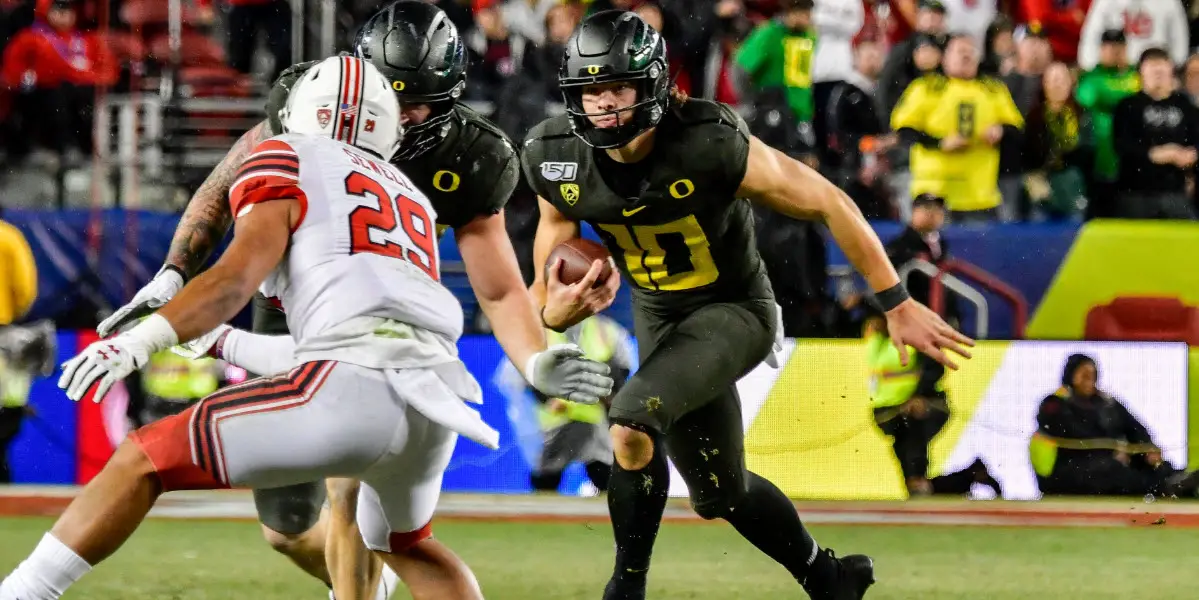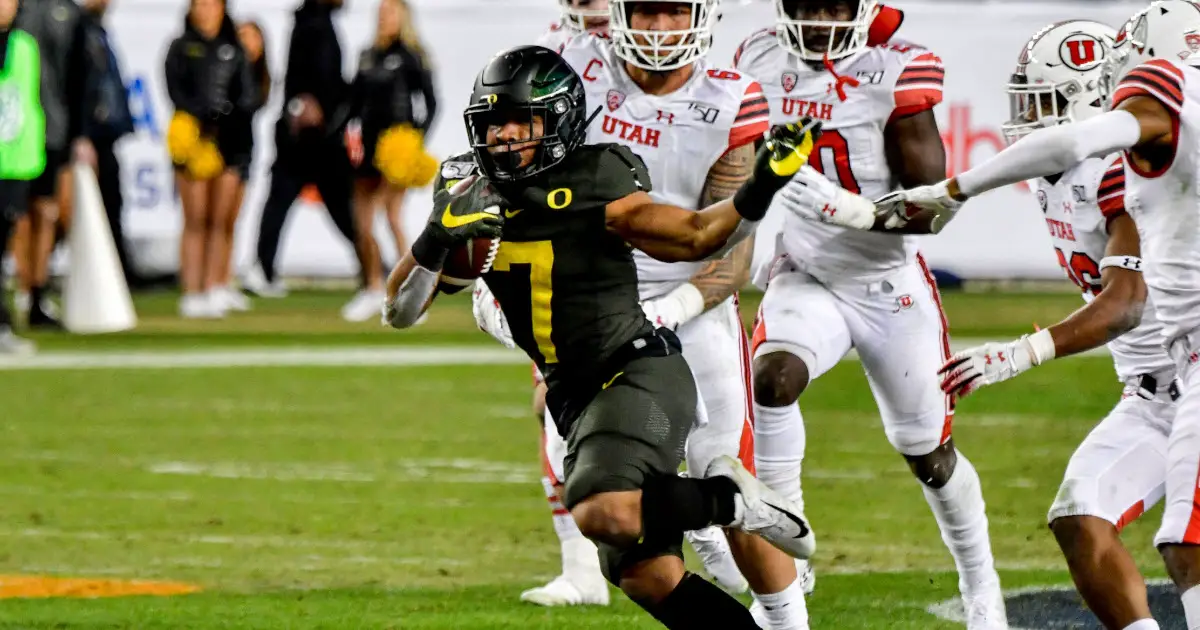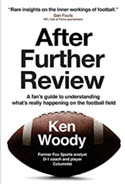In only his second year at the helm, coach Mario Cristobal was able to clutch the Pac-12 championship trophy and smell roses two weeks after ingesting the smell of manure and getting knocked out of national championship contention by Arizona State. His Ducks, looking like studs, scored 37 points on one of the best defenses in the country, and his defense came up with six turnovers to limit a Utah offense averaging 35 points to only 15.
Four of the turnovers came on fourth-down stops, and two more came on interceptions: Troy Dye, one-handed, with help from a big pad on his injured hand, and a beauty by safety Brady Breeze, who was the defensive player of the game with nine official tackles (there were more), a pass breakup and the interception that stopped a shift of momentum in the first quarter.
Fans rubbed their eyes in disbelief as Cristobal broke his concretely established tendencies on the first offensive drive of the game. It finally came to pass, and perhaps out of respect for Utah’s defense, that Justin Herbert was let loose to run the option, which set up CJ Verdell to rush for 208 yards. However, the overall the run dominance was set up by modern offensive moves that showed the Ducks were actually in the 21st century.
On Utah’s opening drive of the game, the Duck defense (above) came up with a huge fourth-down stop of the league’s leading rusher Zack Moss (No. 2). Austin Faoliu (No. 99), Bryson Young (No. 56) and Drayton Carlberg (No. 90) got off blockers to stop Moss cold.
This was crucial to the game’s outcome because the stop denied the Utes a chance to grab momentum early. Anytime an offense goes for it on fourth down and doesn’t convert, there is a gigantic psychological shift for the teams; good for Oregon, deflating for Utah.
The Utes were only able to scratch out 116 yards rushing and had four turnovers on downs. It was no wonder there was despair on the Utah sidelines throughout the game. With one exception in the third quarter, Oregon never allowed the Utes to get a warm, fuzzy feeling on the sidelines.
Herbert (above) fakes to the running back on a run-pass option play, and despite having a receiver (No. 80) coming open on an under crossing route, tucks the ball and runs up field for a four-yard gain. This is the third option on the play, one of the first Herbert decided to keep and run. It showed Utah that Herbert did indeed have the option to keep it himself on an RPO play.
Herbert (above) fakes to running back Cyrus Habibi-Likio (No. 33), and because the defensive end slides down to cover the back, Herbert pulls the ball. Wide receivers are blocking down field and tight end Hunter Kampmoyer (No. 48) arcs to block the corner. No one is on the quarterback, and Herbert runs for 13 yards. This play has been open all season, and this is the first time Cristobal called it.
Utah’s defensive coaches had to huddle and re-evaluate their defensive plan. Since Herbert became a legitimate running threat, they could not sell out on the running back every play. Justin literally blocked a defender away from the inside run because of his run threat.
CJ Verdell (No. 7 above) blows into the end zone behind powerful offensive line blocking. Check the pad level of the Ducks and how they keep their feet moving, with good balance after contact. This isn’t as easy as it looks, but the Utes were reeling from some unanticipated plays that upset the tendencies they practiced against all week.
Safety Brady Breeze (No. 25 above), who was all over the field for the Duck defense, picks off Tyler Huntley’s pass, only his third interception thrown all season season. Breeze played it perfectly, getting depth and keeping leverage on the inside post coming at him. By staying square to the quarterback, Breeze baits Huntley into throwing to the outside post.
It’s an understandable read for Huntley, but Breeze fooled him and was in a great position, hanging on the inside post just long enough for the quarterback to make up his mind and throw. This is one of the best plays by a safety that you could see.
In a perfect play, Herbert and Johnny Johnson III (No. 3 above) combine for a 45-yard score. Johnson does a great job of beating the corner by breaking hard to the inside long enough for the defensive back to turn his feet and hips inside. At the same time, Herbert gives a shoulder fake that convinces the defender he’s throwing, and then quickly turns his eyes to his left to look off any deep defensive backs.
Too bad for the Utes, as Johnson III does not rush his move and breaks to the outside for the score, made to look ridiculously easy, but a gift brought by perfect receiver-quarterback teamwork and pretty good pass protection from the big boys up front.
Utah’s left defensive end (above) can’t crash down to go after Verdell because of the option threat established by Herbert, leaving one less tackler to bother the runner. Center Jake Hanson (No.55) and right guard Dallas Warmack (No. 75) overwhelm the linebacker and defensive tackle and the safety misses the tackle, perhaps due to previous film study showing Duck running backs going down consistently on ankle tackles.
Verdell lowers his body and protects his legs, widens his base and breaks loose. Calvin Throckmorton (No. 54) and receiver Juwan Johnson (No. 6) set the edge with sure, decisive blocks. Oregon rushed for 239 yards against a defense that entered the game giving up only 53 rushing yards per game.

Running Herbert changed the game …
Much of the credit for the offensive show must go to offensive coordinator Marcus Arroyo, who was allowed to call a more creative game than usual. Having Herbert establish the quarterback as a genuine running threat threw the Utes off balance and gave the Duck offensive line some freedom in how they would establish their dominance over a mean, nasty defensive front that bullied opponents during the regular season.
Perhaps Cristobal learned some lessons too: you don’t have to get your inside run game going first; use your weapons and make the defense defend the field, not just the A-gaps. Ahead lie the Wisconsin Badgers, a group of bad boys who know how to knock heads and play hard-nosed defense, just like Utah. Only this time, Badger coaches are going to have to chalk in one defender to cover Herbert, which makes the inside game, and the rest of the offense, all the more explosive.
Coach Ken Woody
Eugene, Oregon Top Photo by Eugene Johnson
Want to learn from Coach Woody in person? He will be analyzing the prior game each week this season at the 6th Street Grill in Eugene on Wednesdays from 6:00 to 7:30 PM with video analysis and opening it up for questions. Join him and learn more football! Charles Fischer
 Spencer Thomas, the FishDuck.com Volunteer Editor for this article, is an attorney for the Social Security Administration in Atlanta, Georgia, and coaches football at Hillgrove High School in Powder Springs, GA.
Spencer Thomas, the FishDuck.com Volunteer Editor for this article, is an attorney for the Social Security Administration in Atlanta, Georgia, and coaches football at Hillgrove High School in Powder Springs, GA.
Dan Fouts, NFL Hall of Fame, Oregon Ducks quarterback: “Entertaining and easy to understand.”
“Every Oregon fan should have a copy to learn from as I do.” Charles Fischer
Buy the book here to learn from Coach Woody, or give a gift of football, a great gift for the fan who wants to learn and enjoy more of the Duck (or whoever your favorite team is) football experience.
Ken Woody is a former Fox Sports football commentator who played defensive back, receiver and kicker for Oregon from 1966 to 1970. He coached college football for 18 years, including stints as an assistant coach at Oregon, Washington, Washington State and Utah State, and was head coach at Whitman College and Washington University-St. Louis. He writes x’s and o’s, a weekly column in the Register-Guard, RG online coverage of Duck football and is the author of “After Further Review—an inside look at what’s really happening on the football field.” Woody is on KUGN (590 am) 2:45 before kickoff and 30 minutes after each game with coaching and game analysis.
Related Articles:
Ducks, Cristobal Answer Nagging Questions: Are the Ducks for Real?
Ducks Hang on in a Rough Ride with Fresno State
Cristobal: "Time to Coach 'Em Up"
"For Real"-Finally, Cristobal Unleashes Herbert in the Red Rose Zone
Coach Woody Analysis: Ducks Need More than the Pistol to Beat Utah
Coach Woody Analysis: Ducks Collapse in the Desert
“I learned football working under many great coaches, among them Len Casanova, Jerry Frei, John Robinson, Bruce Snyder, George Seifert,and Ron Stratten at the University of Oregon, Jim Owens at the University of Washington and Jim Walden at Washington State University. Most of my coaching experience was on the offensive side of the ball with quarterbacks, receivers and kickers although as a head coach I coached defensive backs, linebackers and offensive line.
I achieved my first goal of being the youngest head coach in college football at the age of 26 and throughout my career in coaching and outside of it, as a journalist and broadcaster, have experienced how exciting and gratifying it is teaching the game to others.”


